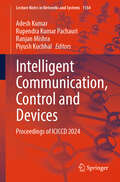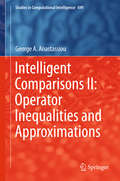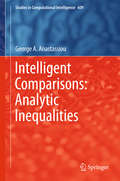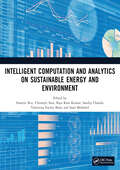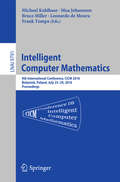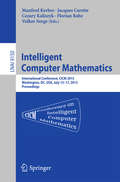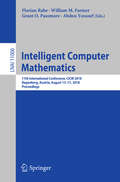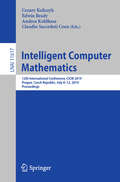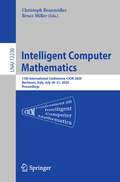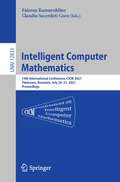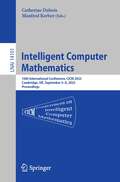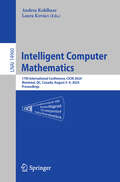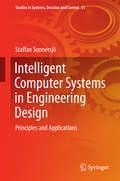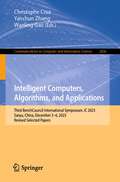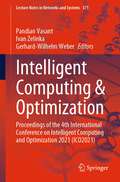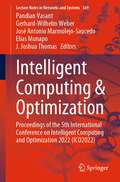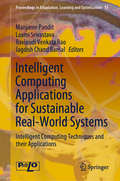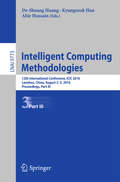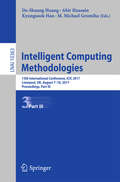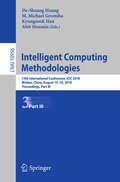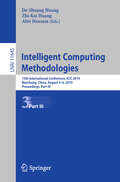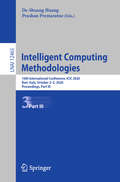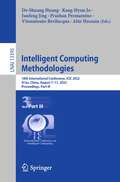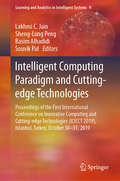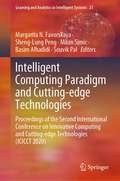- Table View
- List View
Intelligent Communication, Control and Devices: Proceedings of ICICCD 2024 (Lecture Notes in Networks and Systems #1164)
by Ranjan Mishra Adesh Kumar Rupendra Kumar Pachauri Piyush KuchhalThis book focuses on the integration of intelligent communication systems, control systems, and devices related to all aspects of engineering and sciences. It includes high-quality research papers from the 6th International Conference on Intelligent Communication, Control and Devices (ICICCD 2024), organized by the Department of Electrical & Electronics Engineering, School of Advanced Engineering, at UPES, Dehradun, India, during May 30–31, 2024. The topics covered are a range of recent advances in intelligent communication, intelligent control, intelligent devices, and sustainable technologies.
Intelligent Comparisons II: Operator Inequalities and Approximations
by George A. AnastassiouThis compact book focuses on self-adjoint operators' well-known named inequalities and Korovkin approximation theory, both in a Hilbert space environment. It is the first book to study these aspects, and all chapters are self-contained and can be read independently. Further, each chapter includes an extensive list of references for further reading. The book's results are expected to find applications in many areas of pure and applied mathematics. Given its concise format, it is especially suitable for use in related graduate classes and research projects. As such, the book offers a valuable resource for researchers and graduate students alike, as well as a key addition to all science and engineering libraries.
Intelligent Comparisons: Analytic Inequalities
by George A. AnastassiouThis monograph presents recent and original work of the author on inequalities in real, functional and fractional analysis. The chapters are self-contained and can be read independently, they include an extensive list of references per chapter. The book's results are expected to find applications in many areas of applied and pure mathematics, especially in ordinary and partial differential equations and fractional differential equations. As such this monograph is suitable for researchers, graduate students, and seminars of the above subjects, as well as Science and Engineering University libraries.
Intelligent Computation and Analytics on Sustainable Energy and Environment: Proceedings of the 1st International Conference on Intelligent Computation and Analytics on Sustainable Energy and Environment (Conference Proceedings Series on Intelligent Systems, Data Engineering, and Optimization)
by Valentina Emilia Balas Saad Mekhilef Chiranjit Sain Amarjit Roy Raja Ram Kumar Sandip ChandaThe 1st International Conference on Intelligent Computation and Analytics on Sustainable Energy (ICICASEE 2023) was held at Ghani Khan Choudhury Institute of Engineering & Technology (GKCIET), Malda, West Bengal, India. GKCIET is a premier engineering institute located in Malda, West Bengal, India. Being established in 2010, at present the institute offers B.Tech and Diploma Civil Engineering, Mechanical Engineering, Electrical Engineering, Computer Science and engineering and Food process□ing technology. The conference was aimed to provide a platform for researchers, academicians, indus□try professionals, and students to exchange knowledge and ideas on intelligent computation, analytics, and their applications in sustainable energy systems. The Department of Electrical Engineering of the institute hosted the conference from September 21–23, 2023.
Intelligent Computer Mathematics
by Bruce Miller Frank Tompa Michael Kohlhase Moa Johansson Leonardo De MouraThis book constitutes the refereed proceedings of the 9th International Conference on Intelligent Computer Mathematics, CICM 2016, held in Bialystok, Poland, in July 2016. The 10 full papers and 2 short papers presented were carefully reviewed and selectedfrom a total of 41 submissions. The papers are organized in topical sections according to the five tracks of the conference: Calculemus; Digital Mathematics Libraries; Mathematical Knowledge Management; Surveys and Projects; and Systems and Data.
Intelligent Computer Mathematics
by Manfred Kerber Jacques Carette Cezary Kaliszyk Florian Rabe Volker SorgeThis book constitutes the refereed proceedings of the International Conference on Intelligent Computer Mathematics, CICM 2015, held in Washington, DC, USA, in July 2015. The 16 full papers and 9 short papers presented together with two invited talks plus one abstract were carefully reviewed and selected from a total of 43 submissions. The papers are organized in topical sections following the tracks of the conference: Invited Talks; Calculemus; Digital Mathematics Libraries; Mathematical Knowledge Management; Projects and Surveys; Systems and Data.
Intelligent Computer Mathematics: 11th International Conference, CICM 2018, Hagenberg, Austria, August 13-17, 2018, Proceedings (Lecture Notes in Computer Science #11006)
by Florian Rabe William M. Farmer Grant O. Passmore Abdou YoussefThis book constitutes the refereed proceedings of the 11th International Conference on Intelligent Computer Mathematics, CICM 2018, held in Hagenberg, Austria, in August 2018. The 23 full papers presented were carefully reviewed and selected from a total of 36 submissions. The papers focos on the Calculemus, Digital Mathematics Libraries, and Mathematical Knowledge Management tracks which also correspond to the subject areas of the predecessor meetings. Orthogonally, the Systems and Projects track called for descriptions of digital resources, such as data and systems, and of projects, whether old, current, or new, and survey papers covering any topics of relevance to the CICM community.
Intelligent Computer Mathematics: 12th International Conference, CICM 2019, Prague, Czech Republic, July 8–12, 2019, Proceedings (Lecture Notes in Computer Science #11617)
by Cezary Kaliszyk Edwin Brady Andrea Kohlhase Claudio Sacerdoti CoenThis book constitutes the refereed proceedings of the 12th International Conference on Intelligent Computer Mathematics, CICM 2019, held in Prague, Czech Republic, in July 2019. The 19 full papers presented were carefully reviewed and selected from a total of 41 submissions. The papers focus on digital and computational solutions which are becoming the prevalent means for the generation, communication, processing, storage and curation of mathematical information. Separate communities have developed to investigate and build computer based systems for computer algebra, automated deduction, and mathematical publishing as well as novel user interfaces. While all of these systems excel in their own right, their integration can lead to synergies offering significant added value.
Intelligent Computer Mathematics: 13th International Conference, CICM 2020, Bertinoro, Italy, July 26–31, 2020, Proceedings (Lecture Notes in Computer Science #12236)
by Bruce Miller Christoph BenzmüllerThis book constitutes the refereed proceedings of the 13th International Conference on Intelligent Computer Mathematics, CICM 2020, held in Bertinoro, Italy, in July 2020*.The 15 full papers, 1 invited paper and 2 abstracts of invited papers presented were carefully reviewed and selected from a total of 35 submissions. The papers focus on advances in automated theorem provers and formalization, computer algebra systems and their libraries, and applications of machine learning, among other topics. * The conference was held virtually due to the COVID-19 pandemic.
Intelligent Computer Mathematics: 14th International Conference, CICM 2021, Timisoara, Romania, July 26–31, 2021, Proceedings (Lecture Notes in Computer Science #12833)
by Fairouz Kamareddine Claudio Sacerdoti CoenThis book constitutes the refereed proceedings of the 14th International Conference on Intelligent Computer Mathematics, CICM 2021, held in Timisoara, Romania, in July 2021*.The 12 full papers, 7 system descriptions, 1 system entry, and 3 abstracts of invited papers presented were carefully reviewed and selected from a total of 38 submissions. The papers focus on advances in formalization, automatic theorem proving and learning, search and classification, teaching and geometric reasoning, and logic and systems, among other topics.* The conference was held virtually due to the COVID-19 pandemic.
Intelligent Computer Mathematics: 16th International Conference, CICM 2023, Cambridge, UK, , September 5–8, 2023 Proceedings (Lecture Notes in Computer Science #14101)
by Manfred Kerber Catherine DuboisThis book constitutes the refereed proceedings of the 16th International Conference on Intelligent Computer Mathematics, CICM 2023, held in Cambridge, UK, in September 2023.The 14 full papers, 2 project/survey papers, 6 short papers, and 1 tool paper presented were carefully reviewed and selected from a total of 37 submissions. The papers focus on advances in formalization, automatic theorem proving and learning, search and classification, teaching and geometric reasoning, and logic and systems, among other topics.
Intelligent Computer Mathematics: 17th International Conference, CICM 2024, Montréal, QC, Canada, August 5–9, 2024, Proceedings (Lecture Notes in Computer Science #14960)
by Andrea Kohlhase Laura KovácsThis book constitutes the refereed proceedings of the 17th International Conference on Intelligent Computer Mathematics, CICM 2024, held in Montréal, Québec, Canada, during August 5–9, 2024. The 21 full papers presented were carefully reviewed and selected from 28 submissions. These papers have been categorized into the following sections: AI and LLM; Proof Assistants; Logical Frameworks and Transformations; Knowledge Representation and Certification; Proof Search and Formalization & System Descriptions.
Intelligent Computer Systems in Engineering Design
by Staffan SunnersjöThisintroductory book discusses how to plan and build useful, reliable,maintainable and cost efficient computer systems for automated engineeringdesign. The book takes a user perspective and seeks to bridge the gap betweentexts on principles of computer science and the user manuals for commercialdesign automation software. The approach taken is top-down, following the pathfrom definition of the design task and clarification of the relevant designknowledge to the development of an operational system well adapted for its purpose. This introductory text for the practicing engineer working in industry coversmost vital aspects of planning such a system. Experiences from applications ofautomated design systems in practice are reviewed based on a large number ofreal, industrial cases. The principles behind the most popular methods indesign automation are presented with sufficient rigour to give the userconfidence in applying them on real industrial problems. This book is alsosuited for a half semester course at graduate level and has been complementedby suggestions for student assignments grown out of the lecture notes of twopostgraduate courses given annually or biannually during the last ten years atthe Product development program at the School of Engineering at JönköpingUniversity.
Intelligent Computers, Algorithms, and Applications: Third BenchCouncil International Symposium, IC 2023, Sanya, China, December 3–6, 2023, Revised Selected Papers (Communications in Computer and Information Science #2036)
by Yanchun Zhang Wanling Gao Christophe CruzThis book constitutes the proceedings of the First BenchCouncil International Symposium on Intelligent Computers, Algorithms, and Applications, IC 2023, which took place in Sanya, China, in December 2023. The 18 full papers and 8 short papers included in this book were carefully reviewed and selected from 50 submissions. They were organized in topical sections as follows: AI Algorithms and Systems; AI for Ocean science and engineering; AI in finance; AI for education; AI for materials science and engineering; AI for medicine; AI for civil aviation; AI for high energy physics; AI for law.
Intelligent Computing & Optimization: Proceedings of the 4th International Conference on Intelligent Computing and Optimization 2021 (ICO2021) (Lecture Notes in Networks and Systems #371)
by Pandian Vasant Ivan Zelinka Gerhard-Wilhelm WeberThis book of Springer Nature is another proof of Springer’s outstanding and greatness on the lively interface of Smart Optimization, Computational Science, Human Intelligence and Machine Learning! It is a Master Piece of what our community of Academics and Experts can provide when an Interdisciplinary Approach of Joint, Mutual and Deep Learning is supported by Modern Mathematics and Experience of the World-Leader Springer Nature! Fourth edition of International Conference on Intelligent Computing and Optimization took place at December 30–31, 2021, via ZOOM. Objective was to celebrate “Compassion and Wisdom” with researchers, scholars, experts and investigators in Intelligent Computing and Optimization worldwide, to share knowledge, experience, innovation—marvelous opportunity for discourse and mutuality by novel research, invention and creativity. This proceedings book of ICO’2021 is published by Springer Nature—Quality Label of Excellence.
Intelligent Computing & Optimization: Proceedings of the 5th International Conference on Intelligent Computing and Optimization 2022 (ICO2022) (Lecture Notes in Networks and Systems #569)
by Pandian Vasant Gerhard-Wilhelm Weber José Antonio Marmolejo-Saucedo Elias Munapo J. Joshua ThomasThis book of Springer Nature is another proof of Springer’s outstanding and greatness on the lively interface of Smart Computational Optimization, Green ICT, Smart Intelligence and Machine Learning! It is a Master Piece of what our community of academics and experts can provide when an Interconnected Approach of Joint, Mutual and Meta Learning is supported by Modern Operational Research and Experience of the World-Leader Springer Nature! The 5th edition of International Conference on Intelligent Computing and Optimization took place at October 27–28, 2022, via Zoom. Objective was to celebrate “Creativity with Compassion and Wisdom” with researchers, scholars, experts and investigators in Intelligent Computing and Optimization across the planet, to share knowledge, experience, innovation—a marvelous opportunity for discourse and mutuality by novel research, invention and creativity. This proceedings book of ICO’2022 is published by Springer Nature—Quality Label of wonderful.
Intelligent Computing Applications for Sustainable Real-World Systems: Intelligent Computing Techniques and their Applications (Proceedings in Adaptation, Learning and Optimization #13)
by Jagdish Chand Bansal Ravipudi Venkata Rao Manjaree Pandit Laxmi SrivastavaThis book delves into various solution paradigms such as artificial neural network, support vector machine, wavelet transforms, evolutionary computing, swarm intelligence. During the last decade, novel solution technologies based on human and species intelligence have gained immense popularity due to their flexible and unconventional approach. New analytical tools are also being developed to handle big data processing and smart decision making. The idea behind compiling this work is to familiarize researchers, academicians, industry persons and students with various applications of intelligent techniques for producing sustainable, cost-effective and robust solutions of frequently encountered complex, real-world problems in engineering and science disciplines. The practical problems in smart grids, communication, waste management, elimination of harmful elements from nature, etc., are identified, and smart and optimal solutions are proposed.
Intelligent Computing Methodologies
by De-Shuang Huang Kyungsook Han Abir HussainThis book - in conjunction with the volumes LNCS 8588 and LNBI 8590 - constitutes the refereed proceedings of the 10th International Conference on Intelligent Computing, ICIC 2014, held in Taiyuan, China, in August 2014. The 85 papers of this volume were carefully reviewed and selected from numerous submissions. The papers are organized in topical sections such as soft computing; artificial bee colony algorithms; unsupervised learning; kernel methods and supporting vector machines; machine learning; fuzzy theory and algorithms; image processing; intelligent computing in computer vision; intelligent computing in communication networks; intelligent image/document retrievals; intelligent data analysis and prediction; intelligent agent and Web applications; intelligent fault diagnosis; knowledge representation/reasoning; knowledge discovery and data mining; natural language processing and computational linguistics; next gen sequencing and metagenomics; intelligent computing in scheduling and engineering optimization; advanced modeling, control and optimization techniques for complex engineering systems; complex networks and their applications; time series forecasting and analysis using artificial neural networks; computer human interaction using multiple visual cues and intelligent computing; biometric system and security for intelligent computing.
Intelligent Computing Methodologies
by De-Shuang Huang Kyungsook Han Abir Hussain M. Michael GromihaThis book - in conjunction with the volumes LNCS 8588 and LNBI 8590 - constitutes the refereed proceedings of the 10th International Conference on Intelligent Computing, ICIC 2014, held in Taiyuan, China, in August 2014. The 85 papers of this volume were carefully reviewed and selected from numerous submissions. The papers are organized in topical sections such as soft computing; artificial bee colony algorithms; unsupervised learning; kernel methods and supporting vector machines; machine learning; fuzzy theory and algorithms; image processing; intelligent computing in computer vision; intelligent computing in communication networks; intelligent image/document retrievals; intelligent data analysis and prediction; intelligent agent and Web applications; intelligent fault diagnosis; knowledge representation/reasoning; knowledge discovery and data mining; natural language processing and computational linguistics; next gen sequencing and metagenomics; intelligent computing in scheduling and engineering optimization; advanced modeling, control and optimization techniques for complex engineering systems; complex networks and their applications; time series forecasting and analysis using artificial neural networks; computer human interaction using multiple visual cues and intelligent computing; biometric system and security for intelligent computing.
Intelligent Computing Methodologies: 14th International Conference, ICIC 2018, Wuhan, China, August 15-18, 2018, Proceedings, Part III (Lecture Notes in Computer Science #10956)
by De-Shuang Huang Kyungsook Han Abir Hussain M. Michael GromihaThis book constitutes - in conjunction with the two-volume set LNCS 10954 and LNCS 10955 - the refereed proceedings of the 14th International Conference on Intelligent Computing, ICIC 2018, held in Wuhan, China, in August 2018. The 275 full papers and 72 short papers of the three proceedings volumes were carefully reviewed and selected from 632 submissions. The papers are organized in topical sections such as Evolutionary Computation and Learning; Neural Networks; Pattern Recognition; Image Processing; Information Security; Virtual Reality and Human-Computer Interaction; Business Intelligence and Multimedia Technology; Biomedical Informatics Theory and Methods; Swarm Intelligence and Optimization; Natural Computing; Quantum Computing; Intelligent Computing in Computer Vision; Fuzzy Theory and Algorithms; Machine Learning; Systems Biology; Intelligent Systems and Applications for Bioengineering; Evolutionary Optimization: Foundations and Its Applications to Intelligent Data Analytics; Swarm Evolutionary Algorithms for Scheduling and Combinatorial Optimization; Swarm Intelligence and Applications in Combinatorial Qoptimization; Advances in Metaheuristic Optimization Algorithm; Advances in Image Processing and Pattern Techniques; Bioinformatics.
Intelligent Computing Methodologies: 15th International Conference, ICIC 2019, Nanchang, China, August 3–6, 2019, Proceedings, Part III (Lecture Notes in Computer Science #11645)
by De-Shuang Huang Abir Hussain Zhi-Kai HuangThis two-volume set of LNCS 11643 and LNCS 11644 constitutes - in conjunction with the volume LNAI 11645 - the refereed proceedings of the 15th International Conference on Intelligent Computing, ICIC 2019, held in Nanchang, China, in August 2019. The 217 full papers of the three proceedings volumes were carefully reviewed and selected from 609 submissions.The ICIC theme unifies the picture of contemporary intelligent computing techniques as an integral concept that highlights the trends in advanced computational intelligence and bridges theoretical research with applications. The theme for this conference is “Advanced Intelligent Computing Methodologies and Applications.” Papers related to this theme are especially solicited, including theories, methodologies, and applications in science and technology.
Intelligent Computing Methodologies: 16th International Conference, ICIC 2020, Bari, Italy, October 2–5, 2020, Proceedings, Part III (Lecture Notes in Computer Science #12465)
by Prashan Premaratne De-Shuang HuangThis two-volume set of LNCS 12463 and LNCS 12464 constitutes - in conjunction with the volume LNAI 12465 - the refereed proceedings of the 16th International Conference on Intelligent Computing, ICIC 2020, held in Bari, Italy, in October 2020. The 162 full papers of the three proceedings volumes were carefully reviewed and selected from 457 submissions. The ICIC theme unifies the picture of contemporary intelligent computing techniques as an integral concept that highlights the trends in advanced computational intelligence and bridges theoretical research with applications. The theme for this conference is “Advanced Intelligent Computing Methodologies and Applications.” Papers related to this theme are especially solicited, addressing theories, methodologies, and applications in science and technology.
Intelligent Computing Methodologies: 18th International Conference, ICIC 2022, Xi'an, China, August 7–11, 2022, Proceedings, Part III (Lecture Notes in Computer Science #13395)
by Prashan Premaratne De-Shuang Huang Kang-Hyun Jo Abir Hussain Vitoantonio Bevilacqua Junfeng JingThis two-volume set of LNCS 13393 and LNCS 13394 constitutes - in conjunction with the volume LNAI 13395 - the refereed proceedings of the 18th International Conference on Intelligent Computing, ICIC 2022, held in Xi'an, China, in August 2022. The 209 full papers of the three proceedings volumes were carefully reviewed and selected from 449 submissions.This year, the conference concentrated mainly on the theories and methodologies as well as the emerging applications of intelligent computing. Its aim was to unify the picture of contemporary intelligent computing techniques as an integral concept that highlights the trends in advanced computational intelligence and bridges theoretical research with applications. Therefore, the theme for this conference was “Advanced Intelligent Computing Technology and Applications”. Papers focused on this theme were solicited, addressing theories, methodologies, and applications in science and technology.
Intelligent Computing Paradigm and Cutting-edge Technologies: Proceedings of the First International Conference on Innovative Computing and Cutting-edge Technologies (ICICCT 2019), Istanbul, Turkey, October 30-31, 2019 (Learning and Analytics in Intelligent Systems #9)
by Lakhmi C. Jain Sheng-Lung Peng Souvik Pal Basim AlhadidiThis book discusses fundamental and high-level concepts relating to intelligent computing and communications in the context of distributed computing, big data, high performance computing and the Internet of Things. It is becoming increasingly important to develop adaptive, intelligent, computing-centric, energy-aware, secure and privacy-aware mechanisms in high-performance computing and IoT applications. Serving as a useful guide for researchers and practitioners working in the field of information technology and computer science, the book also appeals to beginners wanting to learn more about the better computing paradigm. In addition, it provides a platform for researchers, engineers, academics and industry professionals from around the globe to share their research findings.
Intelligent Computing Paradigm and Cutting-edge Technologies: Proceedings of the Second International Conference on Innovative Computing and Cutting-edge Technologies (ICICCT 2020) (Learning and Analytics in Intelligent Systems #21)
by Margarita N. Favorskaya Sheng-Lung Peng Souvik Pal Basim Alhadidi Milan SimicThis book aims to bring together Researchers, Scientists, Engineers, Scholars and Students in the areas of computer engineering and information technology, and provides a forum for the dissemination of original research results, new ideas, Research and development, practical experiments, which concentrate on both theory and practices, for the benefit of the society. The book also provides a premier interdisciplinary platform for researchers, practitioners and educators to present and discuss the most recent innovations, trends, and concerns as well as practical challenges encountered and solutions adopted in the fields of Computer Science and Information Technology in the context of Distributed computing, Big data, High performance computing, Internet-of-Things, and digital pedagogy. It is becoming increasingly important to develop adaptive, intelligent computing-centric, energy-aware, secure and privacy-aware mechanisms in high performance computing and IoT applications. This book aspires to convey researchers’ experiences, to present excellent result analysis, future scopes, and challenges facing the field of computer science, information technology, telecommunication, and digital pedagogy. This book aims to attract researchers and practitioners who are working in Information Technology and Computer Science. This book is about basics and high level concepts regarding intelligent computing paradigm, communications, and digital learning process. The book serves as a useful guide for Undergraduates, Postgraduates and Research Scholar in the field of Computer Science, Information Technology, and Electronics Engineering. We believe that this volume not only presents novel and interesting ideas but also will stimulate interesting discussions from the participants and inspire new ideas.
